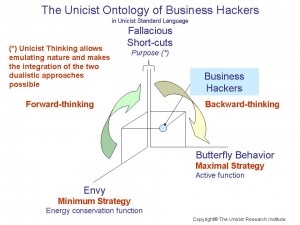Business Hackers are individuals who need to implant business viruses in institutions in order to demonstrate that they are able to dominate them.
 They tend to do everything in their way disregarding the use of established methods, procedures and taxonomies to achieve goals.
They tend to do everything in their way disregarding the use of established methods, procedures and taxonomies to achieve goals.
To introduce viruses they propose short-cuts to achieve profit. Their success is achieved when their proposal is accepted by the greed of their counterparts.
Their butterfly behavior is sustained by conjunctual justifications and the exertion of power. They might use active power or the power of inaction.
Their destruction goal is integrated by envy which is driven by greed and jealousy. They use greed to profit from the environment at a materialistic or emotional level while they feel jealous of the power the organization has.
They are fulfilled when the organizational goals become degraded. They justify their actions by believing and saying that the organization is not such because it could not resist their actions. They are homologous to “computer hackers”.
Inhibiting and entropy-inhibiting unicist business objects are the anti-viruses needed to neutralize their actions.
Access the unicist ontology and taxonomy of “hackers” clicking on:
http://www.unicist.org/sdp/hackers.pdf
